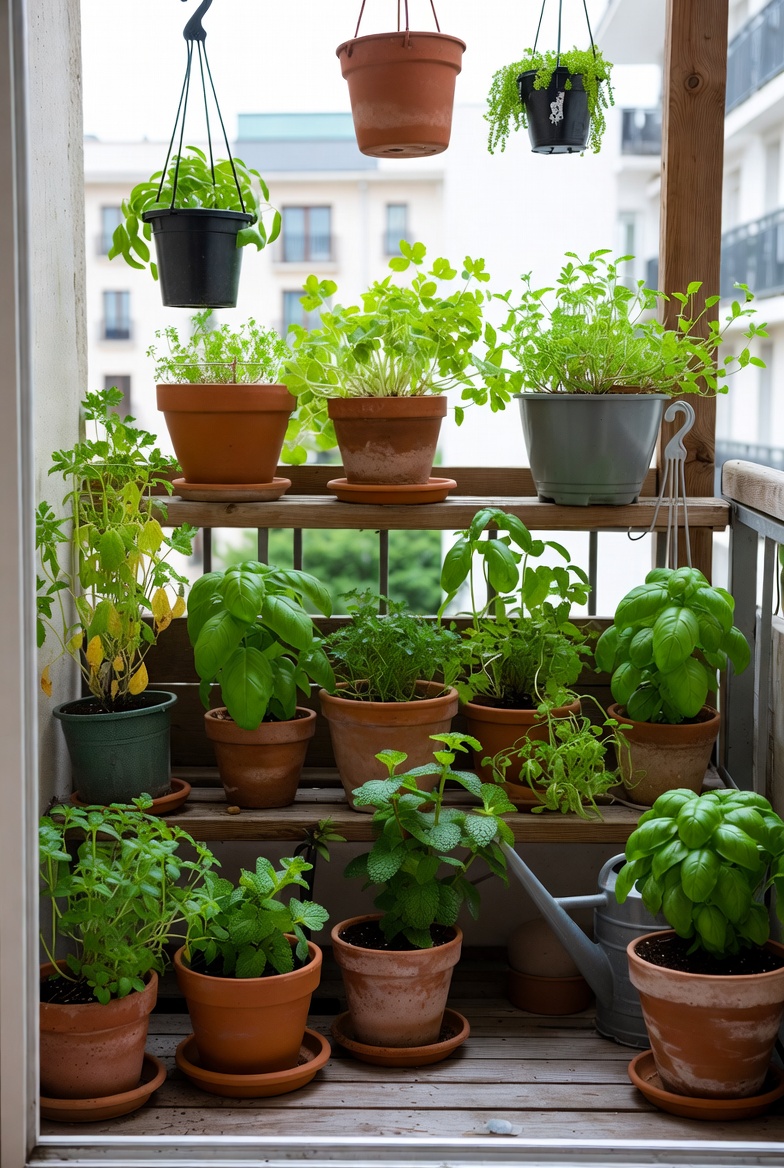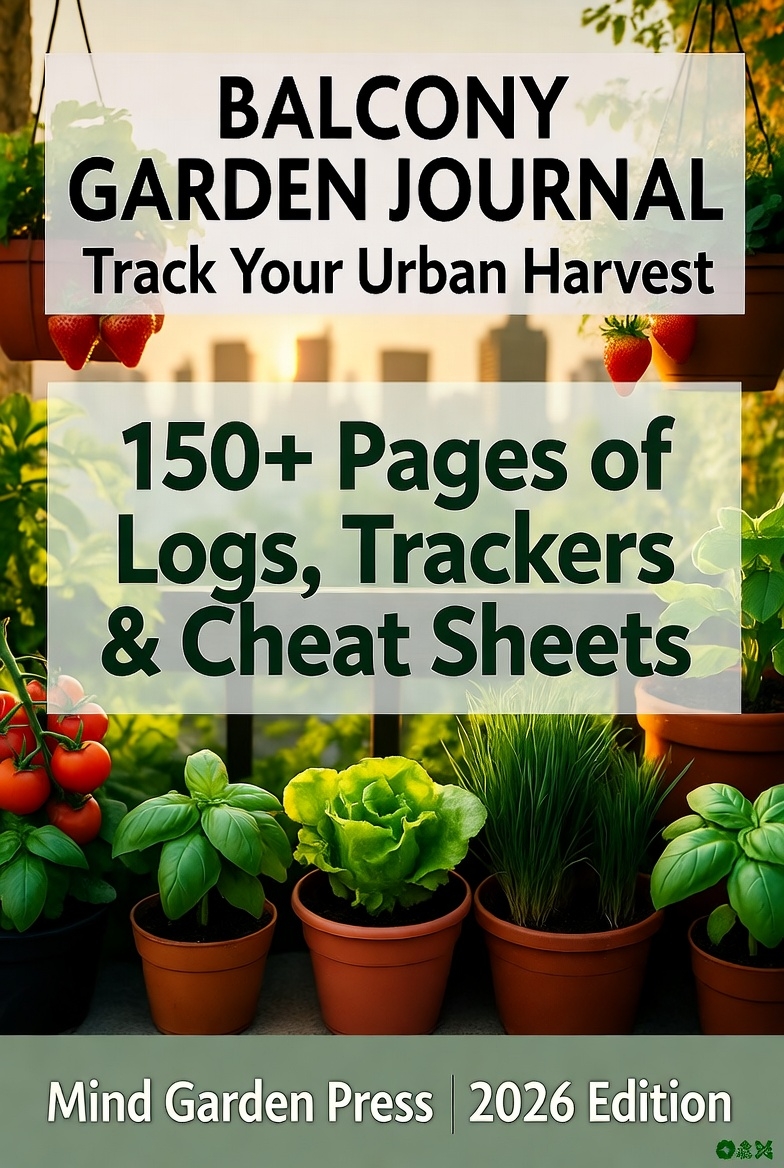
🌿 Sign Up for Your Free 3-Month Gardening Log!
Keep your garden thriving all season long with our 30 Weekly Garden Logs — perfect for tracking plant growth, watering schedules, weather notes, and harvest results.
When you sign up, you’ll also receive a free 3-Month Gardening Log Journal to stay organized and inspired as you grow.
Join below and start logging your garden today!

Balcony Herb Gardening for Beginners: The Complete Step-By-Step Guide
Turn your balcony into a fresh, edible mini-garden using simple, proven methods.
In this guide, you’ll learn how to plan, plant, and care for a thriving balcony herb garden even if you’re short on time, space, and experience.
This article works beautifully alongside the printable journal in my book (ASIN: B0FZVM9K3L), so you can track weekly and yearly growth as you go.

Table of Contents
- Why Balcony Herb Gardening Is Perfect for Beginners
- Balcony Herb Garden Ideas: What People Search For
- Step 1: Plan Your Balcony Herb Garden
- Step 2: Choose the Best Herbs for Your Balcony
- Step 3: Containers, Layout & Vertical Gardening
- Step 4: Soil, Planting & First Watering
- Step 5: Watering, Feeding & Low-Maintenance Care
- Step 6: Year-Round Balcony Herb Gardening
- Deep Dive Guides (Cluster Articles)
- Frequently Asked Questions
Why Balcony Herb Gardening Is Perfect for Beginners
Balcony herb gardening is one of the easiest ways to start growing your own food. You don’t need a yard, expensive tools, or years of experience—just a few containers, the right herbs, and a simple plan.
Low Cost, High Reward
A handful of plants like basil, mint, and chives can replace store-bought herbs all season. You save money, waste less plastic packaging, and get fresher flavor.
Works in Small Spaces
Even a narrow balcony can hold a vertical herb tower or railing planters. You can grow more than you think in just a few square feet.
Relaxing Daily Routine
Stepping outside to water, clip, and smell your herbs becomes a simple daily ritual that lowers stress and keeps you connected to nature.
Balcony Herb Garden Ideas: What People Search For
Before we dive into the step-by-step plan, it helps to know what other balcony gardeners are searching for. Below is a simple visual chart of a few popular phrases related to balcony herb gardening.
| Keyword | Monthly Searches | Search Volume Bar | Competition (KD) | Competition Bar |
|---|---|---|---|---|
| balcony herb garden ideas | 1,200 | 22 | ||
| how to grow herbs on a balcony | 900 | 18 | ||
| best herbs for balcony gardens | 700 | 25 | ||
| easy balcony gardening for beginners | 600 | 15 | ||
| container herb gardening tips | 800 | 28 |
In this pillar guide, we’ll touch on each of these topics and link out to deeper articles so you can explore whatever matters most to you.
Step 1: Plan Your Balcony Herb Garden
Check Your Sunlight
Most herbs prefer at least 4–6 hours of sunlight per day. Stand on your balcony at different times—morning, midday, and late afternoon—and note where the light hits. Use your phone to take quick photos so you can compare later.
Measure Your Space
Grab a tape measure and write down:
- Length and width of your balcony
- Height of railings
- Any wall space that could hold shelves or vertical planters
Step 2: Choose the Best Herbs for Your Balcony
Start with forgiving herbs that bounce back even if you forget a watering or two. You can always add fussier plants later.
Beginner-Friendly Herbs
These herbs are perfect if you’re just getting started:
- Basil – fast-growing, great for sunny balconies
- Mint – thrives in partial shade, excellent in pots
- Chives – hardy, easy to cut and regrow
- Parsley – slow at first, then steady and productive
Low-Maintenance Balcony Stars
If you’re busy or travel often, focus on herbs like:
- Thyme – drought-tolerant, loves full sun
- Oregano – tough and flavorful
- Rosemary – woody and resilient once established
For a deeper breakdown of which herbs to start with, see the dedicated article Best Herbs for Balcony Gardens.
Step 3: Containers, Layout & Vertical Gardening
The right containers make all the difference. On a balcony, you’re not just growing plants—you’re managing weight, drainage, and safety.
Compare Container Options
| Container Type | Best For | Pros | Considerations |
|---|---|---|---|
| Standard Pots | Single herbs | Easy to move, cheap, flexible layout | Can dry out fast in full sun |
| Window Boxes | Mixed herbs | Looks neat, fits railings | Check weight and railing safety |
| Vertical Towers | Many herbs in tiny space | Maximizes small balconies | Needs even watering from top to bottom |
For a full buyer’s guide (including container recommendations), visit Best Containers for Balcony Herbs.
Step 4: Soil, Planting & First Watering
Choose the Right Potting Mix
Use a high-quality potting mix designed for containers. Avoid heavy garden soil—it compacts easily and can suffocate roots in pots.
Planting Basics
- Fill containers about three-quarters full with potting mix.
- Gently loosen the roots of each plant before placing it in the pot.
- Backfill with soil and press lightly to remove big air pockets.
- Water slowly until water begins to drain from the bottom.
Step 5: Watering, Feeding & Low-Maintenance Care
Consistent watering is the secret to healthy balcony herbs. Most herbs prefer evenly moist soil—not soaking wet, not bone dry.
Simple Watering Schedule
Use this as a starting point and adjust based on your climate:
- Hot, sunny balcony: Check soil daily; water when top inch feels dry.
- Partly shaded balcony: Check every 2–3 days.
- Rainy season: Make sure pots drain well and don’t sit in saucers of water.
For more detailed watering advice, visit Watering Tips for Balcony Herb Gardens.
Step 6: Year-Round Balcony Herb Gardening
With a bit of planning, your balcony can stay green almost all year long. In warm climates, many herbs can survive outside; in colder areas, you might move pots indoors or use frost protection.
- Bring tender herbs like basil indoors before the first frost.
- Use fleece, covers, or a small cold frame for hardy herbs.
- Rotate pots so each plant gets enough light during shorter days.
Get the full seasonal checklist in Year-Round Balcony Herb Gardening.
Deep Dive Balcony Herb Gardening Guides
Use these detailed guides to explore specific balcony herb gardening topics:
- How to Grow Herbs on a Balcony (Beginner’s Step-by-Step)
- Easy Balcony Gardening for Beginners
- Best Herbs for Balcony Gardens (Top 10 Easy Varieties)
- Container Herb Gardening Tips You’ll Wish You Knew Sooner
- Vertical Herb Garden for Balcony: Maximize Space in Style
- Low Maintenance Balcony Herbs (Perfect for Busy People)
- Grow Basil on a Balcony: Everything You Need to Know
- Best Containers for Balcony Herbs (Top Picks + Buyer’s Guide)
- Balcony Garden Supplies You Actually Need
- Organic Balcony Gardening: Sustainable Herbs for Every Season
Balcony Herb Gardening FAQ
How many herbs can I grow on a small balcony?
Even on a tiny balcony, you can usually fit 4–8 pots or a single vertical tower with 8–12 herb pockets. Start small so you don’t overwhelm yourself, then add more once you know what grows well in your space.
Do I need special fertilizer for balcony herbs?
Not necessarily. A balanced, slow-release organic fertilizer or occasional liquid feed is usually enough. Follow the label and avoid overfeeding—too much fertilizer can make herbs leggy and weak.
Can I track my balcony garden progress digitally and on paper?
Yes. Many gardeners like using a printable journal (like the one in book ASIN B0FZVM9K3L) alongside photos on their phone. Reviewing both at the end of each season helps you plan an even better balcony garden next year.

Track Your Balcony Garden Progress
Turn your balcony herb garden ideas into a living reality with the Balcony Gardening Journal (ASIN B0FZVM9K3L) — your hands-on companion for planning, tracking, and celebrating every season’s growth.
Record sunlight patterns, watering schedules, weekly notes, and harvests all in one easy place. A perfect match for every cluster guide in your balcony gardening journey.
View the Balcony Gardening Journal on Amazon



















